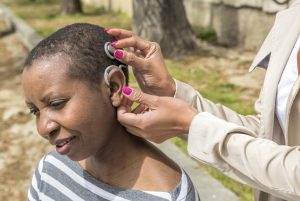'Comply Or Die' Policing Claims A Hearing-Impaired Victim
This issue isn't about "sensitivity" training or "political correctness," it's about getting police officers to follow the law.

(Britta Kasholm-Tengve — Getty Images)
Police, and their sycophants, always like to tell us that “compliance” is the best way to avoid being shot by police. Lack of compliance is not a capital offense in any jurisdiction I’m aware of, but let’s talk about citizens who cannot comply with police instructions that they don’t understand.
You might remember that earlier this summer, police in Miami shot an unarmed African-American caregiver, while he was prone, who was trying to help an autistic person who was playing with a toy truck. The official police response to this incident was, unbelievably, that they were trying to shoot the autistic man, and missed.

Happy Lawyers, Better Results The Key To Thriving In Tough Times
Last week, officers in North Carolina shot at a hearing-impaired man during a traffic stop. The cops did not miss. Daniel Kevin Harris died at the scene.
Police claim that state trooper Jermaine Saunders attempted to pull over Harris, who was allegedly speeding in his Volvo. A “pursuit” followed, and then Harris exited his car — according to police spokespeople I have no earthly reason to believe. From NBC News:
But a neighbor of Harris’, Mark Barringer, who witnessed part of the confrontation, criticized the trooper’s handling of the pursuit.
“They should’ve deescalated and been trained to realize that this is an entirely different situation,” Barringer told NBC affiliate WCNC. “You’re pulling someone over who is deaf. They are handicapped.”
It’s not going to come as a galloping shock to anybody that police don’t handle interactions with the deaf community particularly well:
Sponsored

Curbing Client And Talent Loss With Productivity Tech

AI Presents Both Opportunities And Risks For Lawyers. Are You Prepared?

How The New Lexis+ AI App Empowers Lawyers On The Go

Curbing Client And Talent Loss With Productivity Tech
Howard Rosenblum, CEO of the National Association of the Deaf, said in a statement to NBC News that “there have been too many incidents with tragic consequences between law enforcement officers and deaf people.”
Too often, Rosenblum said, officers order deaf people to comply with verbal commands — then act aggressively when they don’t.
“This has led to many physical altercations between law enforcement officers and deaf individuals over the years, with some resulting in death,” he said.
Interactions between the police and deaf community are always dangerous. But it’s not like officers are instructed to go out there and just wing it. There are clear rules, under the Americans With Disabilities Act, about how law enforcement is supposed to treat hearing-impaired individuals (newsflash: the 4th and 14th Amendments still apply). And there are tips for how to identify and interact with the deaf community.
Still, officers seem woefully undertrained on these issues. I came across a police blog that was trying to give officers some best practices for dealing with the deaf community, and the writer shared a harrowing example of why this is so important:
Law enforcement contacts with deaf subjects can be very serious. During my earliest encounter with a deaf suspect, I almost shot him. I didn’t know he was deaf, and he started reaching in his jacket for what I thought was a gun. So I drew down on him. Then as any young first-year rookie would do, I started screaming commands at him; because any rookie knows, if the subject doesn’t understand you the first time, shouting louder always helps you get your point across. As it turns out, he wasn’t reaching for a gun but for a laminated card that explained he was deaf, a mute, and had directions for obtaining an emergency contact. When his emergency contact arrived, who was also a qualified interpreter, we sorted everything out.
Would I do anything different now that I have 26 years of experience under my belt? Outside of not shouting at the man like a man with his hair on fire, I would still draw down on anybody I thought was reaching for a gun. What has changed is that I now consider the possibility that the person may be disabled and make that part of my decision-making process.
This issue isn’t about “sensitivity” training or “political correctness,” it’s about getting police officers to follow the law. A police culture that values compliance over a reasonable threat assessment is one that will continue to harass and terrorize disabled Americans.
Sponsored

Happy Lawyers, Better Results The Key To Thriving In Tough Times

Law Firm Business Development Is More Than Relationship Building
Full disclosure: my mother is a speech pathologist who specializes with hearing-impaired children.
Miami Police Story Is Probably False, Terrifying If True [ATL Redline]
North Carolina Trooper Fatally Shoots Deaf Man After Traffic Stop [NBC News]
Elie Mystal is an editor of Above the Law and the Legal Editor for More Perfect. He can be reached @ElieNYC on Twitter, where he can hear you just fine, but won’t always comply.







